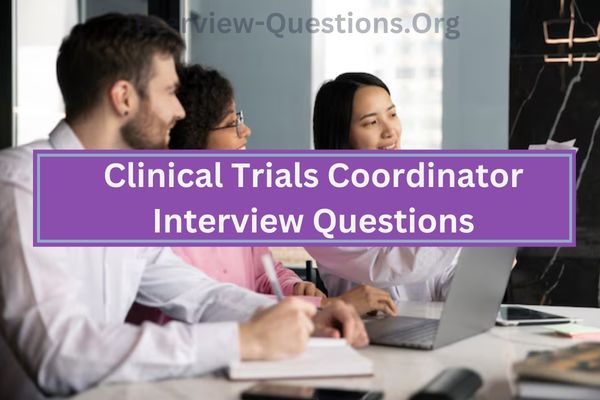The role of a Clinical Trials Coordinator is crucial to the success of clinical studies, ensuring that trials are conducted efficiently, ethically, and in compliance with regulatory standards. Coordinators oversee all aspects of trial operations, from recruitment and data collection to ensuring adherence to protocols and regulations.

Hiring the right candidate for this role requires assessing not only their technical knowledge but also their organizational, communication, and problem-solving skills. This article provides 50 comprehensive interview questions to help employers evaluate candidates’ expertise in managing clinical trials, ensuring they possess the skills necessary to maintain high standards in this complex field.
Also See: Humble Hungry Smart Interview Questions
50 Key Clinical Trials Coordinator Interview Questions
General Background and Experience
- Can you describe your previous experience working as a Clinical Trials Coordinator?
- What clinical trial phases have you worked on?
- How do you ensure you stay updated on the latest clinical trial regulations and guidelines?
- Can you walk me through your experience with subject recruitment for clinical trials?
- Have you ever had to handle multiple trials at once? How did you manage that?
- What type of clinical trials have you coordinated, and which therapeutic areas are you most familiar with?
- Can you describe a time when you faced a significant challenge in a trial and how you handled it?
- What specific regulatory documents are you familiar with, such as FDA or ICH-GCP guidelines?
- How do you ensure compliance with Good Clinical Practice (GCP) in your trials?
- What tools or software have you used to manage clinical trials (e.g., CTMS, EDC, etc.)?
Regulatory and Ethical Considerations
- How do you ensure compliance with IRB/EC requirements?
- Can you explain your experience with the informed consent process?
- What is your approach to ensuring data integrity and confidentiality in clinical trials?
- How do you stay informed about changes to regulatory guidelines or policies that could impact your trials?
- Have you ever been involved in an FDA inspection or audit? How did you prepare for it?
- How do you handle protocol deviations or violations in a trial?
- Can you explain how you handle adverse events and report them appropriately?
- Describe your role in ensuring that a clinical trial complies with ethical standards.
- How do you ensure that the safety of trial participants is always prioritized?
- How do you manage the documentation of Serious Adverse Events (SAEs) and other critical safety data?
Also See: 100+ Escrow Officer Interview Questions
Study Coordination and Logistics
- Can you describe your approach to managing the day-to-day operations of a clinical trial?
- How do you coordinate with different departments (e.g., labs, pharmacies) to ensure smooth trial operations?
- How do you manage timelines and milestones to ensure trials stay on track?
- Have you had experience working with CROs or external vendors? How did you manage those relationships?
- What steps do you take to prepare for the initiation of a new trial?
- Can you walk me through how you organize study-related documents and maintain trial master files (TMFs)?
- How do you handle the logistics of study drug shipment, storage, and accountability?
- What is your process for tracking patient visits and ensuring protocol adherence during those visits?
- Can you describe how you manage patient follow-up and retention in long-term studies?
- How do you ensure that clinical trial data is collected accurately and efficiently?
Communication and Team Collaboration
- How do you ensure effective communication between the principal investigator, study team, and sponsors?
- Describe how you would handle a situation where there is a conflict within the study team.
- How do you communicate complex trial procedures to patients or study participants?
- How do you maintain a productive working relationship with site staff and investigators?
- Can you describe a time when you had to train new staff on study protocols or processes?
- How do you handle communication with study participants, especially when discussing sensitive information?
- What strategies do you use to keep team members informed about trial progress and any issues that arise?
- Have you ever had to resolve a miscommunication that affected a clinical trial? What was the outcome?
- How do you ensure that study participants are comfortable and well-informed throughout the trial?
- Can you give an example of how you have contributed to improving team collaboration in a clinical study?
Also See: 100 Coaching Interview Questions You Must Know
Problem-Solving and Critical Thinking
- How do you handle unexpected challenges, such as low recruitment rates or protocol deviations?
- Can you give an example of a time when you had to solve a complex problem during a trial?
- How do you assess risks in a clinical trial and ensure they are mitigated?
- What would you do if you noticed a recurring issue with data entry or protocol compliance across multiple sites?
- How do you prioritize tasks when you are managing multiple studies at once?
- Can you describe a situation where you had to handle a critical decision independently during a trial?
- How do you stay organized and maintain attention to detail in a fast-paced trial environment?
- How would you handle a situation where a participant wants to withdraw from the study?
- Can you describe how you’ve managed competing deadlines and priorities in previous roles?
- What steps would you take if a site failed to adhere to trial protocols or timelines?
Finding the right Clinical Trials Coordinator is essential for successful trial outcomes. These interview questions help assess candidates’ experience, regulatory knowledge, and problem-solving abilities, ensuring the chosen professional can manage trials effectively, ensure compliance, and safeguard participant well-being throughout the study process.